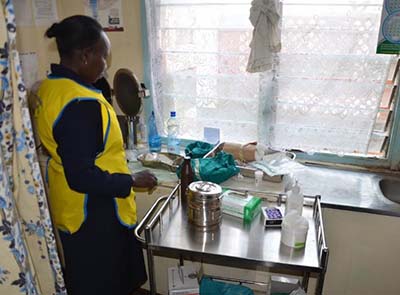SAP’s Design and Co-Innovation Center together with Heidelberg University Hospital has optimised a cervical cancer screening test that combines applied medical research with SAP cloud technology to improve quality of life among women in Africa.
Cervical cancer is the second most common cause of death for women worldwide and ranks number one in Kenya. Although it is easily preventable, most eligible women have never been screened and have no access to healthcare resources.
The digitised screening test, called “Emerging Technologies in Cervical Cancer Screening (ETiCCS)” scooped first prize of the dmi:Design Value Award in 2016 for improving lives according to user-centred design principles.
The cervical cancer screening test was piloted during a one-year study, and was tested on a total of 800 women at the Moi Teaching and Referral Hospital in Eldoret, Kenya.
“The screening technology is the first to combine applied medical research with the power of cloud technology and user-centred design principles for cervical cancer,” says Dr Gilbert Saggia, MD of SAP East Africa. “SAP is very excited about this achievement as we continue to uncover the underlying challenges of cancer screening in Africa and other emerging countries.”
The screening in Kenya is ongoing and the plan is to include countrywide self-sampling and IoT scenarios (lab equipment integration), pattern recognition, deep learning, remote diagnostics support and validation.
“SAP is looking for additional strategic partners with a passion for improving people’s lives and strengthening Africa’s healthcare systems,” says Dr Saggia. “The aim for SAP East Africa is to collaborate towards a global 2030 vision for user-centred design and cloud technology to improve cancer screening and further uncover the underlying challenges of cancer screening in emerging countries.”
With the help of technology such as SAP HANA Cloud Platform the user-centred solution runs on a single platform across multiple roles which enables seamless communication between all parties, even in very remote areas and environments with unstable Internet connectivity.
Thanks to role-specific data entry the solution is easy to use and access to patient data and test results are immediately available to the local hospital and to Heidelberg University Hospital in Germany.
Through the use of the technology, medical staff have now reduced paperwork meaning no duplication or opportunities for human error to affect test results. The medical records are safely stored in the cloud providing instant access to results. This enables labs to accelerate the screening process and empower medical staff through improved quality control embedded in the screening process.
Realtime access to data and reporting, fully compliant with data privacy and security requirements, means labs can make informed diagnoses regardless of location or region.
The project stands to transform healthcare screening services by combining user-centred design with on-site user research that enables healthcare professionals to uncover critical patient insights and adapt the solution to other screening processes and field research.
ETiCCS’ vision is to support the fight against cancer in fragile infrastructures. With this solution, hundreds of women in Kenya now have access to screening for cervical cancer during the first pilot phase.
Professor Magnus von Knebel Doeberitz, medical director of the Department of Applied Tumor Biology, Institute of Pathology at Heidelberg University Hospital, comments: “Through the ETiCCS program, we were able to complement applied medical research around biomarkers with the power of cutting edge cloud technology to bring co-innovation to Africa in a way which really helps to improve people’s lives.”
Currently all personal records are kept in Kenya, with pseudonyms data uploaded through the SAP mobile solution. The mobile solution creates a number based on the pseudonyms data and links to the patient test results. However, the mapping between the generated number and patient is done on site by a medical professional. The app will be made available through SAP to other interested countries in Africa as a custom development solution.

